Prionopelta nominata
| Prionopelta nominata | |
|---|---|

| |
| Scientific classification | |
| Kingdom: | Animalia |
| Phylum: | Arthropoda |
| Class: | Insecta |
| Order: | Hymenoptera |
| Family: | Formicidae |
| Subfamily: | Amblyoponinae |
| Tribe: | Amblyoponini |
| Genus: | Prionopelta |
| Species: | P. nominata |
| Binomial name | |
| Prionopelta nominata (Smith, F., 1871) | |
| Synonyms | |
| |
This species has been found in rainforests and on coral limestone on New Guinea and the Solomon Islands. Nests have been found in rotten wood.
Identification
Shattuck (2008) - for the synonomized P. majuscula: Anterolateral corners of head, near mandibular insertions, generally rounded or at most with a very small, obscure tooth on each side. Dorsal mesosomal sculpturing reduced to minor irregularities. Size intermediate, head width between 0.49mm and 0.58mm.
Keys including this Species
Distribution
Latitudinal Distribution Pattern
Latitudinal Range: -1.950000048° to -9.366669655°.
| North Temperate |
North Subtropical |
Tropical | South Subtropical |
South Temperate |
- Source: AntMaps
Distribution based on Regional Taxon Lists
Indo-Australian Region: Indonesia (type locality), New Guinea (type locality), Solomon Islands.
Distribution based on AntMaps
Distribution based on AntWeb specimens
Check data from AntWeb
Countries Occupied
| Number of countries occupied by this species based on AntWiki Regional Taxon Lists. In general, fewer countries occupied indicates a narrower range, while more countries indicates a more widespread species. |

|
Estimated Abundance
| Relative abundance based on number of AntMaps records per species (this species within the purple bar). Fewer records (to the left) indicates a less abundant/encountered species while more records (to the right) indicates more abundant/encountered species. |

|
Biology
Castes
Worker
Images from AntWeb
   
| |
| Worker. Specimen code casent0172308. Photographer April Nobile, uploaded by California Academy of Sciences. | Owned by ANIC, Canberra, Australia. |
   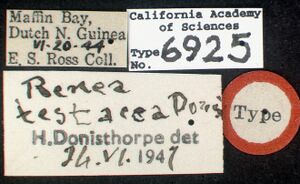
| |
| Syntype of Renea testacea. Worker. Specimen code castype06925-03. Photographer April Nobile, uploaded by California Academy of Sciences. | Owned by CAS, San Francisco, CA, USA. |
Queen
Images from AntWeb
   
| |
| Queen (alate/dealate). Specimen code casent0172310. Photographer April Nobile, uploaded by California Academy of Sciences. | Owned by ANIC, Canberra, Australia. |
   
| |
| Queen (alate/dealate). Specimen code casent0434885. Photographer Erin Prado, uploaded by California Academy of Sciences. | Owned by CAS, San Francisco, CA, USA. |
   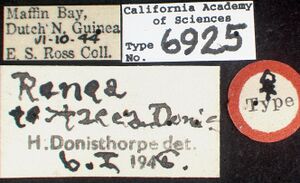
| |
| Syntype of Renea testacea. Queen (alate/dealate). Specimen code castype06925-01. Photographer April Nobile, uploaded by California Academy of Sciences. | Owned by CAS, San Francisco, CA, USA. |
  
| |
| Specimen code castype06987. . | |
Male
Images from AntWeb
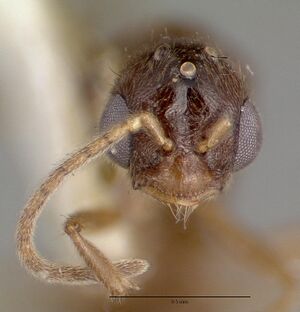   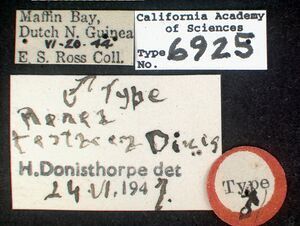
| |
| Syntype of Renea testacea. Male (alate). Specimen code castype06925-02. Photographer April Nobile, uploaded by California Academy of Sciences. | Owned by CAS, San Francisco, CA, USA. |
 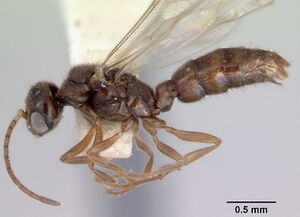    
| |
| Male (alate). Specimen code casent0172309. Photographer April Nobile, uploaded by California Academy of Sciences. | Owned by ANIC, Canberra, Australia. |
     
| |
| Male (alate). Specimen code casent0178837. Photographer Erin Prado, uploaded by California Academy of Sciences. | Owned by CAS, San Francisco, CA, USA. |

| |
| Specimen code casent0102525. . | |
Nomenclature
The following information is derived from Barry Bolton's Online Catalogue of the Ants of the World.
- nominata. Ponera nominata Smith, F. 1871a: 323.
- Replacement name for Ponera simillima Smith, F. 1860b: 105. [Junior primary homonym of Ponera simillima Smith, F. 1860b: 104.]
- Combination in Prionopelta: new combination (unpublished).
- Senior synonym of churchilli: new synonymy (unpublished).
- Senior synonym of majuscula: new synonymy (unpublished).
- Senior synonym of poultoni: new synonymy (unpublished).
- Senior synonym of testacea: new synonymy (unpublished).
- [Note: because the conditions of Article 23.9.1 of ICZN (4th edition, 1999) do not appear to have been satisfied, the previously overlooked nominata Smith, F. 1871a: 323, the first proposed replacement name for the junior homonym simillima Smith, F. 1860b: 105, takes priority over churchilli, majuscula, poultoni, and testacea (B.Bolton note, 17.v.2016).]
- Distribution: Indonesia (Irian Jaya), Papua New Guinea, Solomon Is.
- churchilli. Examblyopone churchilli Donisthorpe, 1949g: 401 (q.) NEW GUINEA (Indonesia).
- Type-material: holotype queen, 2 paratype queens.
- Type-locality: Indonesia: Irian Jaya (“Dutch New Guinea”), Maffin Bay, ix.1944 (E.S. Ross).
- Type-depositories: BMNH (holotype), CASC (paratypes).
- Junior synonym of majuscula: Brown, 1951: 102; Wilson, 1958a: 149; Brown, 1960a: 177; Bolton, 1995b: 365; Shattuck, 2008b: 27.
- Junior synonym of nominata: syn. n. (unpublished).
- [Note: see discussion under nominata.]
- majuscula. Prionopelta majuscula Emery, 1897c: 595 (w.q.) NEW GUINEA (Papua New Guinea).
- Type-material: syntype workers (number not stated), 1(?) syntype queen.
- Type-locality: Papua New Guinea: Beliao I., nr Friedrich-Wilhemshafen (= Madang) (L. Biró).
- Type-depositories: HNHM, MSNG.
- Status as species: Forel, 1901b: 5; Dahl, 1901: 18; Emery, 1911d: 33; Wheeler, W.M. 1935g: 9; Chapman & Capco, 1951: 26; Brown, 1951: 102; Brown, 1953c: 12; Wilson, 1958a: 148; Brown, 1960a: 177, 220; Bolton, 1995b: 365; Shattuck, 2008b: 27 (redescription); Sarnat, et al. 2013: 69.
- [Note: in Brown, 1953c: 12, and Wilson, 1958a: 144, majuscula is the oldest junior synonym of simillima Smith, F. 1860b: 105; hence first available replacement name.]
- Junior synonym of nominata: new synonymy (unpublished).
- [Note: see discussion under nominata.]
- poultoni. Prionopelta poultoni Donisthorpe, 1932c: 462.
- Unnecessary (second) replacement name for Ponera simillima Smith, F. 1860b: 105. [Junior primary homonym of Ponera simillima Smith, F. 1860b: 104.]
- Junior synonym of majuscula: Brown, 1953c: 12; Wilson, 1958a: 148; Brown, 1960a: 177; Bolton, 1995b: 365; Shattuck, 2008b: 27.
- Junior synonym of nominata: syn. n. (unpublished).
- [Note: see discussion under nominata.]
- testacea. Renea testacea Donisthorpe, 1947d: 183, fig. 1 (w.m.) NEW GUINEA (Indonesia).
- Type-material: 10 syntype workers, 4 syntype males.
- Type-locality: Indonesia: Irian Jaya (“Dutch New Guinea”), Maffin Bay, 16.vi.1944, and 20.vi.1944 (E.S. Ross).
- Type-depositories: BMNH, CASC.
- Donisthorpe, 1948d: 590 (q.).
- Status as species: Donisthorpe, 1948d: 590; Chapman & Capco, 1951: 77.
- Junior synonym of majuscula: Brown, 1953c: 12, Wilson, 1958a: 149; Brown, 1960a: 177; Bolton, 1995b: 365; Shattuck, 2008b: 27.
- Junior synonym of nominata: syn. n. (unpublished).
- [Note: see discussion under nominata.]
Unless otherwise noted the text for the remainder of this section is reported from the publication that includes the original description.
Taxonomic Notes
Because the conditions of Article 23.9.1 of ICZN (4th edition, 1999) do not appear to have been satisfied, the previously overlooked nominata Smith, F. 1871a: 323, the first proposed replacement name for the junior homonym simillima Smith, F. 1860b: 105, takes priority over churchilli, majuscula, poultoni, and testacea (B.Bolton note, 17.v.2016).
Description
Worker
Shattuck (2008) - for the synonomized P. majuscula: (n=5) CI 78–81; HL 0.61–0.69; HW 0.50–0.56; ML 0.74–0.79; PetL 0.18–0.20; PetW 0.25–0.29; PI 138–155; SI 61–66; SL 0.32–0.34; T1W 0.36–0.43.
Anterolateral corners of head, near mandibular insertions, generally rounded and lacking a tooth but occasionally with a very small, obscure tooth on each side. Dorsal mesosomal sculpturing reduced to minor irregularities consisting of fine punctuations. Lateral mesosomal sculpturing weakly developed on pronotum and anterior and ventral region of mesopleuron, dorsal region of mesopleuron and majority of propodeum smooth. Fenestra present within subpetiolar process. Colour pale yellow, queens sometimes yellow-brown.
Type Material
- Prionopelta majuscula: Syntype, worker(s), queen(s), New Guinea, Museo Civico di Storia Naturale, Genoa.
- Examblyopone churchilli Donisthorpe, 1949: Holotype, queen, Maffin Bay, Irian Jaya, Indonesia, The Natural History Museum.
- Examblyopone churchilli Donisthorpe, 1949: Paratype, 1 queen, Maffin Bay, Irian Jaya, Indonesia, California Academy of Sciences.
- Ponera simillima F. Smith, 1860: Holotype, queen, New Guinea, The Natural History Museum.
- Renea testacea Donisthorpe, 1947: Syntype, worker(s), male(s), Maffin Bay, Irian Jaya, Indonesia, The Natural History Museum.
- Renea testacea Donisthorpe, 1947: Syntype, 3 worker, 6 males, 1 queen, Maffin Bay, Irian Jaya, Indonesia, California Academy of Sciences.
The following notes on F. Smith type specimens have been provided by Barry Bolton (details):
Ponera simillima
In the original description Smith states that the type-specimens are workers, but only queens of this taxon are present in his collection. It is assumed here that he miswrote the caste in the description, though this can not be proved; the four queens of the species are regarded here as the syntypes, though perhaps incorrectly.
One dealate queen syntype in The Natural History Museum. Labelled “Dor. 20” (= Dory I., New Guinea).
Three dealate queen syntypes in Oxford University Museum of Natural History. Labelled “Dor.” One specimen has a Donisthorpe type-label and a det. label “P. poultoni,” Donisthorpe’s replacement name for the preoccupied simillima. One of the others has a Donisthorpe det. label from 1931, “simillima.”
References
- Brown, W.L., Jr. 1951. New synonymy of a few genera and species of ants. Bulletin of the Brooklyn Entomological Society 46: 101-106 (doi:10.5281/zenodo.24586). (page 102, Senior synonym of churchilli)
- Brown, W. L., Jr. 1953c. Characters and synonymies among the genera of ants. Part I. Breviora 11: 1-13 (page 12, Senior synonym of poultoni and testacea)
- Emery, C. 1897c. Formicidarum species novae vel minus cognitae in collectione Musaei Nationalis Hungarici quas in Nova-Guinea, colonia germanica, collegit L. Biró. Természetr. Füz. 20: 571-599. (page 595, worker, queen described)
- Hamer, M.T., Pierce, M.P., Guénard, B. 2023. The Amblyoponinae (Formicidae) of Hong Kong. Asian Myrmecology 16, e016005 (doi:10.20362/am.016005).
- Shattuck, S.O. 2008b. Revision of the ant genus Prionopelta in the Indo-Pacific region. Zootaxa 1846:21-34.
References based on Global Ant Biodiversity Informatics
- Brown W. L., Jr. 1960. Contributions toward a reclassification of the Formicidae. III. Tribe Amblyoponini (Hymenoptera). Bulletin of the Museum of Comparative Zoology 122: 143-230.
- CSIRO Collection
- Chapman, J. W., and Capco, S. R. 1951. Check list of the ants (Hymenoptera: Formicidae) of Asia. Monogr. Inst. Sci. Technol. Manila 1: 1-327
- Chapman, J.W. and S.R. Capco. 1951. Check list of the ants (Hymenoptera: Formicidae) of Asia. Monographs of the Institute of Science and Technology (Manila) 1: 1- 327
- Dahl F. 1901. Das Leben der Ameisen im Bismarck-Archipel, nach eigenen Beobachtungen vergleichend dargestellt. Mitt. Zool. Mus. Berl. 2: 1-70.
- Donisthorpe H. 1947. Some new ants from New Guinea. Annals and Magazine of Natural History (11)14: 183-197.
- Donisthorpe H. 1948. A third instalment of the Ross Collection of ants from New Guinea. Annals and Magazine of Natural History (11)14: 589-604.
- Donisthorpe H. 1949. A seventh instalment of the Ross Collection of ants from New Guinea. Annals and Magazine of Natural History (12)2: 401-422.
- Emery C. 1897. Formicidarum species novae vel minus cognitae in collectione Musaei Nationalis Hungarici quas in Nova-Guinea, colonia germanica, collegit L. Biró. Természetrajzi Füzetek 20: 571-599.
- Emery C. 1911. Hymenoptera. Fam. Formicidae. Subfam. Ponerinae. Genera Insectorum 118: 1-125.
- Forel A. 1901. Formiciden aus dem Bismarck-Archipel, auf Grundlage des von Prof. Dr. F. Dahl gesammelten Materials. Mitt. Zool. Mus. Berl. 2: 4-37.
- Janda M., G. D. Alpert, M. L. Borowiec, E. P. Economo, P. Klimes, E. Sarnat, and S. O. Shattuck. 2011. Cheklist of ants described and recorded from New Guinea and associated islands. Available on http://www.newguineants.org/. Accessed on 24th Feb. 2011.
- Lucky A., L. E. Alonso, E. Sarnat, and J. Hulr. 2015. Ants and scolytine beetles. In: Richards, S.J. and N. Whitmore (editors) 2015. A rapid biodiversity assessment of Papua New Guinea's Hindenburg Wall region. Wildlife Conservation Society Papua New Guinea Program. Goroka, PNG.
- Shattuck, S. O. 2008. Revision of the ant genus Prionopelta (Hymenoptera: Formicidae) in the Indo-Pacific region. Zootaxa 1846:21-34.
- Snelling R. R. 2000. Ants of the Wapoga river area, Irian Jaya, Indonesia. In Mack, Andrew L. and Leeanne E. Alonso (eds.). 2000. A Biological Assessment of the Wapoga River Area of Northwestern Irian Jaya, Indonesia. RAP Bulletin of Biological Assessment 14, Conservation International, Washington, DC.
- Stitz H. 1911. Australische Ameisen. (Neu-Guinea und Salomons-Inseln, Festland, Neu-Seeland). Sitzungsberichte der Gesellschaft Naturforschender Freunde zu Berlin 1911: 351-381.
- Viehmeyer H. 1912. Ameisen aus Deutsch Neuguinea gesammelt von Dr. O. Schlaginhaufen. Nebst einem Verzeichnisse der papuanischen Arten. Abhandlungen und Berichte des Königlichen Zoologischen und Anthropologische-Ethnographischen Museums zu Dresden 14: 1-26.
- Wheeler W.M. 1935. Check list of the ants of Oceania. Occasional Papers of the Bernice Pauahi Bishop Museum 11(11):1-56.
- Wheeler, William Morton.1935.Checklist of the Ants of Oceania.Occasional Papers 11(11): 3-56
- Wilson E. O. 1958. Studies on the ant fauna of Melanesia. I. The tribe Leptogenyini. II. The tribes Amblyoponini and Platythyreini. Bulletin of the Museum of Comparative Zoology 118: 101-153.
- Wilson E.O. 1959. Adaptive shift and dispersal in a tropical ant fauna. Evolution 13(1): 122-144.
- Wilson Edward O. 1959. Adaptive Shift and Dispersal in a Tropical Ant Fauna. Evolution 13(1): 122-144

